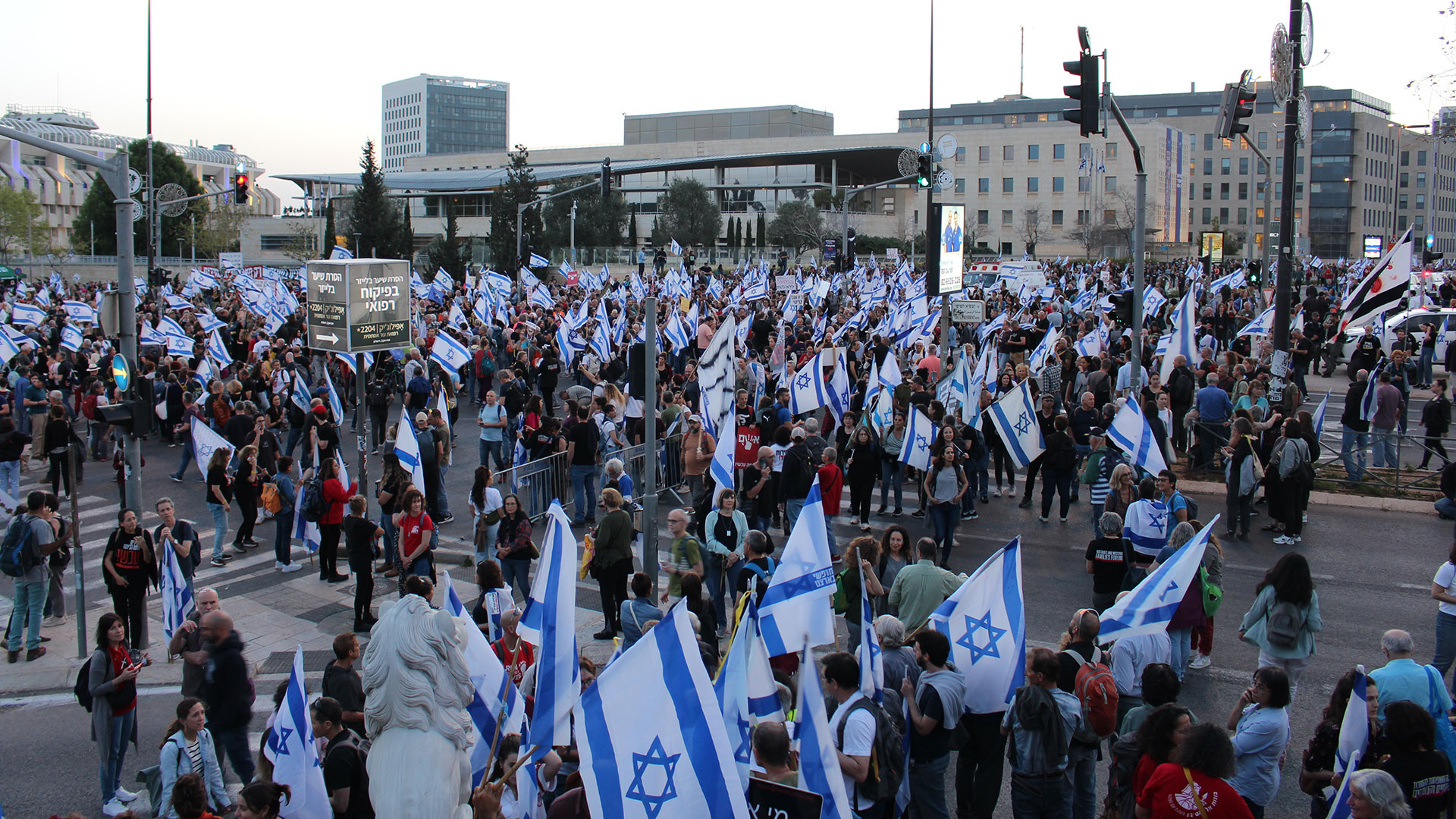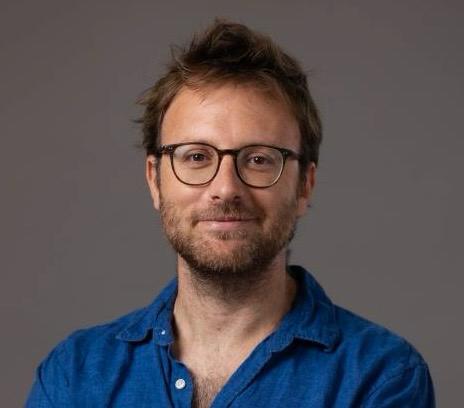Constitutional law expert Adam Shinar is alarmed by the onslaught on basic rights in Israel amid the Gaza war. Netanyahu, Ben Gvir and Smotrich are finding alternative ways to undermine Israel's democracy beyond the controversial judicial reform.
zenith: More than half a year has passed since October 7 and the start of the war in Gaza. Internally, a struggle for basic rights such as freedom of expression is raging in Israel. What is the state of the Israeli democracy right now?
Adam Shinar: The Israeli democracy entered this war relatively weak and embattled. Between January and September 2023, Israel was faced with the so-called “juidical overhaul”: A reform, planned by the government, that would introduce a lot of political elements into the administration of justice and weaken the power of the Supreme Court. Ultimately, the overhaul failed – partly because of the protests delaying them, partly because of the war overshadowing it. Now – instead of an overhaul, we are faced with a death of thousand cuts.
What do you mean by that?
We're seeing a government coalition, where the extreme, nationalist and religious right are in power: We're seeing fascist, racist elements inside the Ministry of National Security, led by Itamar Ben Gvir and his party. Finance Minister Bezalel Smotrich, another fascist extremist, has managed to get powers usually reserved for the Ministry of Defense get transferred to his portfolio. The judicial reform may have died, but we see new land grabs in the West Bank, attempts to legalize illegal outposts, and unadressed settler violence towards the Palestinians. And we see the constant weakening of free speech inside Israel: It began with the closing down of the channel Al-Midan, affiliated with Hezbollah, Al Jazeera has been banned and international media outlets can now be shut down if perceived as harmful to national security.
Is the Israeli democracy weaker than before October 7?
I think it is very natural for a country to constrict and narrow civil liberties in times of war, and we had a similar situation during COVID. Now, more than half a year in, people are becoming more sceptical. Not that the support for the war has immensely declined, but the rally-around-the-flag effect that you saw in the beginning has somewhat dwindled. And even the Supreme Court, which in the beginning chose to limit individual rights in several, very problematic decisions, is becoming more critical of the government. The global opinion is shifting, and people have come to pause. Today, there is more self-reflection within the country, at least compared to October or November.
Let’s delve into some cases: Nadera Shalhoub-Kervorkian, a Palestinian-Israeli professor for International Law at the Hebrew University, has been arrested in April and indicted on support of terrorism charges. How could that happen?
First of all, we shouldn't look at her as an isolated case. I think it's part of a larger trend. She is maybe the most extreme and well-known example, but there were many, many indictments against Israeli Arabs for allegedly identifying with Hamas in October and November. We are talking about dozens of cases, prosecutions, arrests, and interrogations. As for Shalhoub-Kevorkian, we are witnessing a pure political persecution. Nothing that she did or said, was criminal.
She arguably downplayed the atrocities on October the 7th, and claimed, that “women’s bodies are being used as political weapons.”…
…minimizing the atrocities that happened, the sexual atrocities, is – as despicable as it is – not a criminal offense in Israel. And she did definitely not deny October 7 as such. And one should note that she made these statements in a podcast a month before her arrest. The only way that I can explain this for myself is, that we have a police, that is headed by a nationalist fascist minister. I don't know if he gave the order to the police to investigate: Legally speaking, he is not allowed to. But of course, Ben Gvir’s spirit, his policies and his preferences infiltrate the police agenda. Shalhoub-Kevorkian was not a legal case. She was released 24 hours after she was arrested, and the judge didn't really understand why she was brought there in the first place.
So what is this case about?
The arrest of Shalhoub-Kevorkian was orchestrated to please the right wing in Israel, and went to show, that the government is acting against all those leftist intellectuals, who have weight in the international arena and who say all these ‘horrible things՚ about us.
There have been considerable policy changes concerning freedom of speech in Israel. For example, for quite some time, legal investigations don’t have to be greenlit by the State Prosecutor’s Office anymore, a lot of anti-war demonstrations have been banned. What’s your assessment of these interventions?
The policy, that gave the police maybe not a free reign, but a relatively strong independence, has already been taken back, and of course, most of these cases evolved around October the 7, and by now they have been closed. I think the number of cases relating to terrorism charges have died down considerably. Regarding the protests, they are definitely back, although the people calling for an end of the war are a minority.
You wrote a long piece about censorship in Haaretz some weeks ago.
The article deals with cultural censorship in the history of Israeli film industry, a topic that I am currently researching, and which allows for many parallels to be drawn. In the piece, I argue, that in Israel, formal and official censorship has been replaced by much more sophisticated self-censorship.
Military censorship is no longer an effective tool?
No. First of all there's international media to consider. Military censorship only has power over Israeli outlets. Does it exert control? Yes, I mean to an extent it does of course govern the media, but with technology and the internet, self-censorship is much more effective. Major outlets are aware that certain topics will upset viewers, and so they don’t air them.
There was one condition Ben Gvir and his party submitted to Netanyahu to enter this coalition two years ago: The subordination of the police under his ministry. How do the police forces develop in Israel under Ben Gvir?
Itamar Ben Gvir announced the appointment of the next police commissioner, and suggested someone who is politically very close to him. Right now, Ben Gvir has the power to formulate general investigation principles, but he cannot intervene in individual investigations. However, once you have a chief commissioner aligned with your own political agenda, you don’t need a formal amendment anymore. Since there is a petition against the subordination of the police forces under his ministry, it is on the Supreme Court to decide. But in any case, Ben Gvir has many ways to secure his power within the police forces. Most and foremost through promotions and appointments.
Besides the case of Shalhoub-Kevorkian, how does this power shift manifest elsewhere?
Ben-Gvir is obviously a racist, extreme Jewish nationalist 20% of Israelis are Arab and we have a severe crime problem in the Arab communities. Under his tenure as minister, the number of murders in Arab communities has skyrocketed. However, Ben Gvir couldn’t care less. It's just not in line with his policies. He doesn't treat it as a significant issue, as Arabs are not part of his constituency. So it's not just about whether the police is political. It's also about whether the police will do its job by providing equal service to all segments of Israeli society.
You said before that the government took a wait-and-see approach when dealing with the judicial overhaul. Where does the proposed reform currently stand?
They decided to split the reform into several trenches. The judicial appointments, the reasonableness clause, and other parts. The reasonableness clause has been struck down by the Supreme Court. Now, with the war still going on, the government doesn’t push for further reforms of the overhaul: When entering the war cabinet, Benny Gantz and Netanyahu agreed that the judicial overhaul would not be touched for the time being. If Gantz leaves, who knows what will happen. But for sure, Netanyahu and his coalition are trying everything they can to implement policies that are in the spirit of that reform. Weakening the media and the police. It is anybody’s guess what will happen, once this war will be “over”.
Where do you see the country in six months?
Currently, the fabric of Israeli society unravelling. The hostage issue has been politicized. People have been internally displaced, and the government and the members of Knesset are seen as a bunch of opportunists. The military has suffered a severe blow in terms of not being able to predict October 7, and Netanyahu is perceived as somebody who puts himself and his potential trial first.
How will Israeli democracy be affected?
I think it's very difficult to deal with all these things and still think that Israel in some sense is a functioning democracy. One could of course also question whether Israel was a full democracy coming into this – because of the occupation. It is questionable whether a country, that occupies another people, denying it basic rights for 57 years, can be called a democracy. It was a flawed democracy to begin with. But I think now, Israeli democracy is more vulnerable than ever.
A rather worrying conclusion…
I think there's a real question of whether the commitment to liberal values in Israel is that strong. We see a strengthening of religious, ultra-orthodox and right-wing elements in Israel. Whether Israeli liberalism or a version of it will be able to survive, is really the central question, as many forces in the government are illiberal. Sustaining these values will be more and more difficult. It was always difficult to be liberal when you're constantly under a state of siege, threatened by Iran and Hezbollah, Hamas or Islamic Jihad, and when you are faced with violence in the West Bank. Under all these circumstances, it's very hard to develop a robust commitment to liberty, freedom and free speech, because you constantly have to make concessions in the name of security. And the trade-off will almost always favour security.
Adam Shinar





